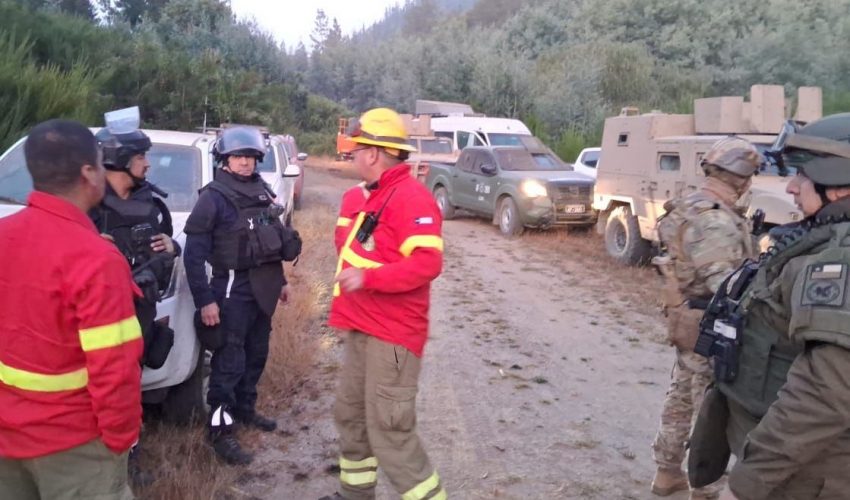- While the government defends this measure for landowners and increased fines, industry groups point to shortcomings in prevention, firefighting, prosecution, and forest recovery.
This week, following the resumption of legislative activity, the urgency given by the Executive to the Fire Law bill regained importance.
It gained particular relevance after the fires in Viña del Mar and the more recent one in Tirúa in the Biobío region. In the latter, Public Forces were requested to combat 19 simultaneous fire outbreaks in areas called "El Malo" and "El Cardal," with around 200 hectares affected by flames.
In this context, Esteban Valenzuela, Minister of Agriculture, explained some aspects of the Fire Law bill. "In short, there are three structural things: mandatory firebreaks for small, medium, and large landowners. We committed, as requested by lawmakers, to seek assistance for small landowners. But there must be responsibility. You can’t have forests with overgrown grass and pruning waste left unattended. Firebreak zones must be established where appropriate, as determined by CONAF."
Regarding the urban-rural interface, the Minister of Agriculture stated, "We who are believers cannot keep praying that a mega-fire won’t happen in Greater Concepción. Forests loom over Penco and Tomé. This interface is crucial. When CONAF, in coordination with municipalities, dictates what must be done, it must be mandatory for landowners in these interface zones."
The Agriculture Minister also detailed that, regarding the private sector, "fines can range from 1 to 3,000 Monthly Tax Units (UTM). If they persist in non-compliance, CONAF or the municipality can intervene and bill the owner. If their negligence contributes to a major fire, fines can reach up to 10,000 UTM."
"Finally, the concept of buffer zones is introduced. The law includes something extraordinary here: estates under Article 701, previously restricted to forestry, can transition to mixed-use—incorporating pastures, agriculture, and firebreaks—without penalties for not being 100% forested. We must move toward a more resilient landscape, one that’s been neglected, where mixed agriculture can reduce fires. Active agriculture, not abandoned farmland," affirmed Esteban Valenzuela.
Industry Groups
Juan José Ugarte, president of the Chilean Wood Corporation (CORMA), commented on the Fire Law bill’s pros and cons: "With 6,000 to 7,000 annual fires in Chile—over 99% human-caused—we must act differently to avoid tragedies like Viña del Mar. A modern, effective legal framework can help prevent fires, improve firefighting, enhance intelligence to anticipate fires, prosecute perpetrators, and restore burned forests, which leave poverty and marginalization in their wake."
"The Executive’s bill moves in the right direction but falls short. Had this law been approved earlier, the Viña del Mar tragedy could have been avoided," he added.
What’s Missing
According to CORMA’s president, the new fire regulations lack four pillars. "First, strengthening prevention at the rural-urban interface, as proposed, but also empowering local communities, mayors, and governors to prepare year-round, reducing fire-prone conditions."
Second, Ugarte noted, "preventive climate deployment is needed. Rural and forest fires are not just forestry issues—they’re human-caused, but spread due to climate events. Early risk forecasts should trigger preventive measures: deploying military or police to high-risk zones, halting industries, mobilizing workers, and containing negligent or intentional fires. The bill partially addresses prevention but not comprehensively."
Another key point for CORMA is firefighting. "Evidence supports strengthening nighttime firefighting. While 30% of Chile’s fires start at night, less than 10% of brigades operate then—despite higher efficiency due to lower temperatures, no wind, and higher humidity. Nighttime aerial firefighting is feasible with existing technology and skilled pilots. Seasonal firefighters should also become year-round professionals," stated the timber industry leader.
Investigation
CORMA’s president highlighted investigation as another pillar. "Like the Timber Theft Law, which reduced theft by 82% in 18 months by empowering judges, police, and prosecutors, we need similar tools for arson. Thermal cameras, drones, and high-quality imagery exist—yet the bill ignores equipping law enforcement to pursue fire-related crimes."
Small and Medium Landowners
The timber industry argues the bill "penalizes small and medium landowners, forcing them to fund and maintain firebreaks indefinitely without assistance. It also neglects post-fire forest recovery."
"A fire law cannot ignore over 24,000 plantation owners and 90,000 native forest owners severely impacted by human actions," Ugarte asserted.
Michel Esquerré, president of PYMEMAD (a Biobío small/midsize forest owners’ group), said the bill "ignores operational realities. For example, firebreaks could consume half a small owner’s land, while penalties for arsonists remain unchanged."
He added, "The bill is misguided—it doesn’t distinguish between small and large owners or adequately pursue fire starters. From a small-forestry perspective, it offers no protections or aid."
Agricultural Sector
José Miguel Stegmeier, president of the Biobío Agricultural Society (SOCABIO), stressed, "Of course, we need the best possible legislation to prevent and fight fires."
Stegmeier emphasized, "Most rural and forest fires are intentional. The law must address this, providing preventive tools."
He added, "Such a law should mandate governments, police, prosecutors, and judges to coordinate actions—including intelligence—to apprehend and prosecute those who deliberately start fires in high-risk zones."
Source:www.diarioconcepcion.cl







Comentarios (0)
No hay comentarios aún. ¡Sé el primero en comentar!
Deja un comentario